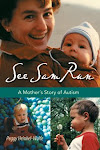(first published 2/20/10)
A dear friend of Mark’s clipped an op-ed piece for me from The New York Times earlier this month. Another person might have sent me a link, or emailed the essay, but I liked Mary’s hand-written note and her careful clipping, which included the date at the top of the paper – a full citation.
In the piece, Roy Richard Grinker, the father of a teenage girl with autism, advocates for the elimination of Asperger’s and PDD-NOS as subsets of autism. He made a good case, and we can leave the outcome of what belongs in the diagnostic manual to the experts.
Grinker also made compelling argument that the spectrum diagnosis gives families little information about the future. Sam was diagnosed with autism when he was 4 years old by a skillful pediatrician. However, I was skeptical of the doctor’s prediction that Sam would be functioning well enough by the time he was 14 or 15 that most people wouldn’t know he had it. Grinker’s experience read much like ours. His daughter had all the symptoms for an autism diagnosis when she was 3 and is now a quirky high school senior.
Grinker wrote that if his daughter were diagnosed now, as a teen, she would likely be diagnosed with Asperger’s instead. We’ve had that same experience with Sam.
A diagnosis doesn’t predict the future, but early intervention – the kind that helps speech and language development, even if it has to be augmented – can have an effect. Well-planned and executed educational therapy is the only proven way to help kids with autism adapt.
And it doesn’t have to be 40 hours a week of one-on-one. We found that a house set up for enriched, structured play – the way Maria Montessori envisioned her school rooms – went a long, long way.
There may be potential in other treatments, but it is incumbent upon parents, like physicians, to first do no harm. That’s not as easy as you think. Parents who fear they are drowning will grasp at straws. We need to get better about communicating to parents what is proven and effective; and help them have faith in incremental progress. I remember how hard it was to have faith that Sam’s small bits of progress each day or week would add up over time. But really, truly, they do.
When Sam was diagnosed in April 1992, there were three other people in the room to support us besides the pediatrician. They swept in with resources and suggestions and contacts in the community. I don’t think I’ve ever fully appreciated what that support meant to us until just now, writing this. Thanks for doing it right, Dr. James Copeland, wherever you are.






No comments:
Post a Comment